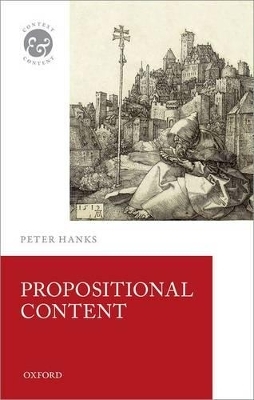
Propositional Content
Seiten
2015
Oxford University Press (Verlag)
978-0-19-968489-2 (ISBN)
Oxford University Press (Verlag)
978-0-19-968489-2 (ISBN)
Peter Hanks defends a new theory about the nature of propositional content, according to which the basic bearers of representational properties are particular mental or spoken actions. He explains the unity of propositions and provides new solutions to a long list of puzzles and problems in philosophy of language.
Peter Hanks defends a new theory about the nature of propositional content. According to this theory, the basic bearers of representational properties are particular mental or spoken actions. Propositions are types of these actions, which we use to classify and individuate our attitudes and speech acts. Hanks abandons several key features of the traditional Fregean conception of propositional content, including the idea that propositions are the primary bearers of truth-conditions, the distinction between content and force, and the concept of entertainment. The main difficulty for this traditional conception is the problem of the unity of the proposition, the problem of explaining how propositions have truth conditions and other representational properties. The new theory developed here, in its place,explains the unity of propositions and provides new solutions to a long list of puzzles and problems in philosophy of language.
Peter Hanks defends a new theory about the nature of propositional content. According to this theory, the basic bearers of representational properties are particular mental or spoken actions. Propositions are types of these actions, which we use to classify and individuate our attitudes and speech acts. Hanks abandons several key features of the traditional Fregean conception of propositional content, including the idea that propositions are the primary bearers of truth-conditions, the distinction between content and force, and the concept of entertainment. The main difficulty for this traditional conception is the problem of the unity of the proposition, the problem of explaining how propositions have truth conditions and other representational properties. The new theory developed here, in its place,explains the unity of propositions and provides new solutions to a long list of puzzles and problems in philosophy of language.
Peter Hanks is an associate professor in the Department of Philosophy at the University of Minnesota. His research is in philosophy of language and the history of analytic philosophy.
Acknowledgements ; Introduction ; 1. Three pictures of content ; 2. The problem of the unity of the proposition ; 3. Predication and unity ; 4. Cancellation and the content-force distinction ; 5. Proper names and types of reference acts ; 6. Empty names ; 7. Propositional attitude reports ; 8. First-person propositions ; 9. Asking and ordering ; Conclusion ; References ; Index
| Erscheint lt. Verlag | 9.7.2015 |
|---|---|
| Reihe/Serie | Context & Content |
| Verlagsort | Oxford |
| Sprache | englisch |
| Maße | 143 x 219 mm |
| Gewicht | 416 g |
| Themenwelt | Geisteswissenschaften ► Philosophie ► Metaphysik / Ontologie |
| Geisteswissenschaften ► Philosophie ► Sprachphilosophie | |
| Geisteswissenschaften ► Sprach- / Literaturwissenschaft ► Sprachwissenschaft | |
| ISBN-10 | 0-19-968489-8 / 0199684898 |
| ISBN-13 | 978-0-19-968489-2 / 9780199684892 |
| Zustand | Neuware |
| Informationen gemäß Produktsicherheitsverordnung (GPSR) | |
| Haben Sie eine Frage zum Produkt? |
Mehr entdecken
aus dem Bereich
aus dem Bereich
eine philosophische Reise
Buch | Softcover (2024)
Goldmann (Verlag)
14,00 €
Auf dem Weg zu einer postkritischen Philosophie
Buch | Softcover (2023)
Suhrkamp (Verlag)
38,00 €


